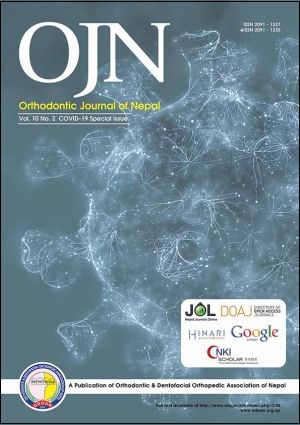Perception of BDS students of Kathmandu University on online learning during COVID-19 pandemic
DOI:
https://doi.org/10.3126/ojn.v10i2.31064Keywords:
BDS students, lockdown, online class, pandemic, perceptionAbstract
Introduction: The spread of COVID-19 pandemic has gripped the entire world and caused widespread public health concerns, hampered economics and education system immensely. Online classes have been an alternative to give continuity to the theory classes. The objective of this study is to assess the various aspects of online classes and perception of Bachelor of Dental Surgery (BDS) students of Kathmandu University (KU) during COVID-19 pandemic.
Materials and Method: Cross-sectional, questionnaire based descriptive study using online Google form was distributed among the BDS students of KU. The questionnaire was distributed via social media. Frequency distribution of the descriptive data was done. Chi-square test was done to assess the difference in perception about online classes between the basic science and clinical science students.
Result: 89% of the students had never attended any online classes before online education due to COVID-19 pandemic. 76.9% agreed that the online class is distracting. 57.5% used smartphone for seeking online class and medium most frequently used was Zoom platform. 70.2% students could ask questions, communicate & receive response during online class. 55.4% students disagreed that online classes are more effective. Statistical significant differences were seen in students submitting assignments, communication and practical simulation among basic science and clinical science students.
Conclusion: Online class can serve as an alternative effective educational tool. With more practice, system upgrading, capacity building of the student-teacher; it is bound to be more effective as well as efficient. The online class should be designed in such a way that student can focus and find it more interesting and should introduce various strategies to increase the interaction between students and teachers. Further, training on online class is required for both course recipients and providers.
Downloads
Downloads
Published
How to Cite
Issue
Section
License
Copyright © held by Orthodontic & Dentofacial Orthopedic Association of Nepal
- Copyright on any research article is transferred in full to the Orthodontic & Dentofacial Orthopedic Association of Nepal upon publication in the journal. The copyright transfer includes the right to reproduce and distribute the article in any form of reproduction (printing, electronic media or any other form).
- Articles in the Orthodontic Journal of Nepal are Open Access articles published under the Creative Commons CC BY License (https://creativecommons.org/licenses/by/4.0/)
- This license permits use, distribution and reproduction in any medium, provided the original work is properly cited.




